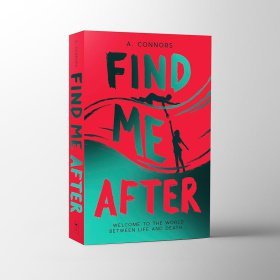I grab the ejected rizatriptan and pop it quickly into my mouth, ignoring the gritty pavement coating stuck to it. Then I kind of crab walk until I’m inside the bus shelter that I just spotted nearby.
Nice going, Kyle. Super dignified.
I collapse with my back against the far wall like I’m a soldier diving into a foxhole.
Captain Cower at your service, sir!
I hope the kids didn’t see.
I close my eyes and try to focus on the rizatriptan as it dissolves against my gum. It tastes like a mouth ulcer, like when you keep a paracetamol on your tongue for too long.
But I feel safer here. I stare hard at the timetable on the opposite wall and try to distract myself from the stale, gritty diesel and urine smells of the bus shelter. My chest feels like a wicker basket that somebody’s pounding on with a hammer.
I’m not usually this bad, not even after a seizure, I think. Maybe I hit my head when I fell? Maybe I have a bleed, or a clot, or maybe I’m in some kind of neurological shock?
You’re not where you think you are.
I’m terrified that the kids are going to be waiting outside, ready to jump me. I hold my breath and listen. Silence. I twist and peer round the wall of the bus shelter. Nothing.
The street is empty in both directions.
But there’s nowhere for them to have gone?
I press my hands against my temples and squeeze hard. I hate this. I hate that I’m seventeen and I should be out having fun but instead I’m hiding in a bloody bus shelter. I hate that I can’t even trust my own brain.
Then I realize that it’s not just the kids who have vanished.
There are no people at all. No traffic.
I can’t even hear the bypass.
It’s not me, I think. It’s everything else.
The thought is strange and terrifying.
I remember the old guy who stopped earlier. I can’t shake the sense that he was real, but no one else was. “Keep moving,” he said.
But where? Any minute now the storm in my brain is going to turn into a hurricane and I’ll fry myself from the inside out. I won’t make it home.
Hospital, I think.
I let the thought settle for a moment. I don’t love the idea. I’ve spent far too much time in hospitals to ever go there voluntarily.
But I don’t have a choice. Something is wrong. Very wrong.
I pull myself to my feet and swipe at the tears and snot smeared over my face. Hospital is another fifteen minutes away: left after the bridge, past the industrial estate.
I can do it … Probably.

THREE
I cross the bypass by an arching concrete bridge that everyone calls the Banana Bridge. The light is messed up. The sky is flat, the sun invisible. The road is empty, but it shouldn’t be at this time of day. Wrongness crawls through every vein and artery in my body. My vision fills with scotomas: colourful shards of glass that scintillate across my vision and follow my eyeline wherever I look.
Below me, the deserted bypass leads down to the A5 and from the A5 to the M1 and then to London. How many times have I imagined myself getting the National Express that way? How many times have I studied the map of central London, the great knotted mass of A-roads that converge on the West End like arteries converging on the brain stem?
People only live in this town because they were born here and they don’t know how to get out. But people go to London. They go searching for … something.
I like that.
Whenever I come back from a seizure Mum says, “You’re special, Kyle. God can keep you any time He likes, but He sends you back because He knows you have a reason to be here.”
I’m not sure the logic follows. You don’t throw a fish back into the ocean because you think they have a reason for being there. But the image is fitting today. It feels like God still has one hand holding on to my ankle.
Mum likes all that God stuff. She can’t get enough of it. New churches, new ministers. She always wants more than any of them can offer.
More what? I wonder. More certainty. More conviction.
Mum “faith-dates”. It’s a desperate sort of hobby, like Tinder for God.
Swipe right on Seventh-Day Adventists.
Swipe left on the Baptists.
Swipe right for Methodists.
The Seventh-Day Adventists were my favourite. Tall men in pin-striped suits clutching leatherbound bibles to their chests. They were a quiet, tentative bunch, until they started singing and then all hell (or maybe heaven?) let loose. But then, one time, I had a seizure during a service and things got weird after that. Sideways looks, hands reaching out to touch my shoulder as I walked in, like they thought I was about to start speaking in tongues or something. We didn’t last much longer.

























